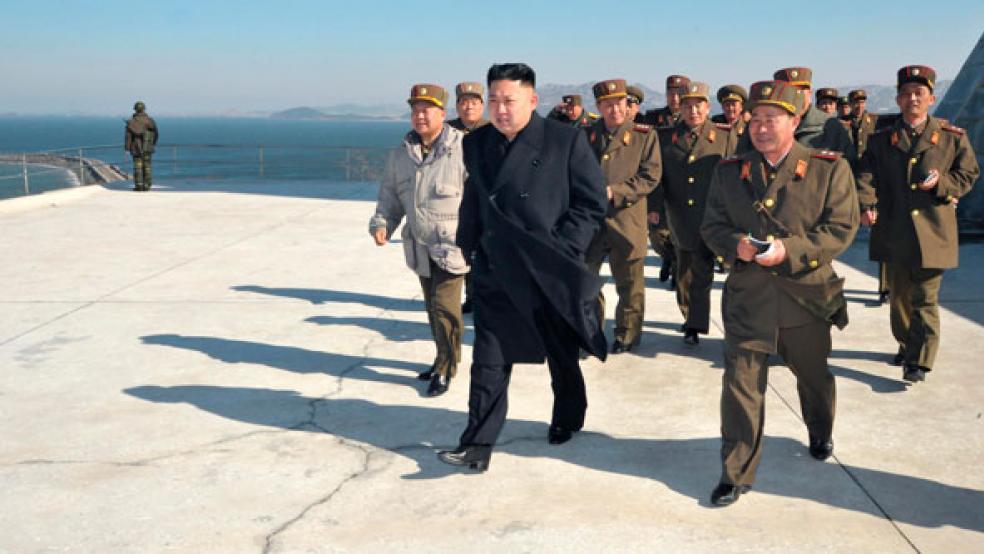North Korea repeated threats on Tuesday to target U.S. military bases as Washington and its allies tightened economic sanctions against the isolated country by targeting Pyongyang's main foreign exchange bank with new measures.

The rhetoric from North Korea - which has threatened the United States with nuclear war and rehearsed drone attacks on South Korea - and Washington's hardening reaction, drew more concern from China, Pyongyang's only major ally, which said the situation was "sensitive."
Pyongyang says United Nations sanctions, agreed after North Korea carried out a third nuclear test in February, are part of a Washington-led plot to topple its leadership.
RELATED: The Cold War Heats Up Between the U.S. and North Korea
"From this moment, the Supreme Command of the Korean People's Army will be putting into combat duty posture No. 1 all field artillery units, including long-range artillery units and strategic rocket units, that will target all enemy objects in U.S. invasionary bases on its mainland, Hawaii and Guam," the North's KCNA news agency said.
The order was issued in a statement from the North Korea's military "supreme command."
The Pentagon condemned North Korea's rhetoric, saying it was designed to "raise tensions and intimidate others."
"They need to stop threatening peace on the peninsula. That doesn't help anyone ... and we stand ready to respond to any contingency," Pentagon spokesman George Little told reporters.
The Pentagon has declined to define the range of North Korea's rockets, saying it is classified. But Admiral James Winnefeld, vice chairman of the Joint Chiefs of Staff, acknowledged on March 15 that one type of North Korean missile likely had the range to reach the United States.
South Korea's defense ministry said it saw no sign of imminent military action by North Korea and most military analysts say Pyongyang will not risk a conflict with the United States that it would lose.
RELATED: Will the U.S. Spend $100 Billion to Stop a Madman?
South Korea and the U.S. military are conducting military drills until the end of April, which they have stressed are strictly defensive in nature. The North accuses Washington of war preparations by using B-52 bombers which have flown over the Korean peninsula as part of the drills, and it has abrogated an armistice that ended the 1950-53 Korean War.
The Pentagon said there have been three such flights by U.S. B-52 bombers since March 8, with the most recent one on Monday.
BANK SANCTIONS?
Officials said Japan and Australia plan to impose sanctions on North Korea's Foreign Trade Bank as part of U.S.-led efforts targeting Pyongyang's funding for its nuclear program. China again called on all parties to show restraint. "At present, the situation on the Korean peninsula remains complex and sensitive," said Foreign Ministry spokesman Hong Lei.
Pyongyang's aggressive rhetoric appears to mark a further attempt to boost the military credentials of Kim Jong-un, who took power in December 2011 after the death of his father. He has cemented the role of the military and the North's nuclear weapons and missile ambitions with the nuclear test and two long-range rocket launches.
KCNA said Tuesday that Kim had guided a landing operation by combined units including the North Korean navy.
"This is a mythmaking for the (military) commander," said Jeung Young-tae, a senior analyst at the Korea Institute of National Unification in Seoul.
Many Americans appeared unfazed by what the Pentagon described as a "well-worn pattern" of rhetoric and threats from Pyongyang. "I think they're threatening more than anything else. I don't feel very threatened," said Sophie Hara, a Hawaii resident. "It's just a bluff."
South Korea marked the third anniversary on Tuesday of the sinking of a navy ship that killed 46 sailors that it and the United States have blamed on North Korea. Pyongyang denied the charge. On March 22, South Korea and the United States signed a "counter-provocation plan" meant to fine tune joint reaction to any future North Korean military strikes. The Pentagon said details of the plan were classified.
This article is by Jack Kim and Ju-min Park of Reuters. Additional reporting by Phil Stewart in Washington and Suzanne Roig in Honolulu.




